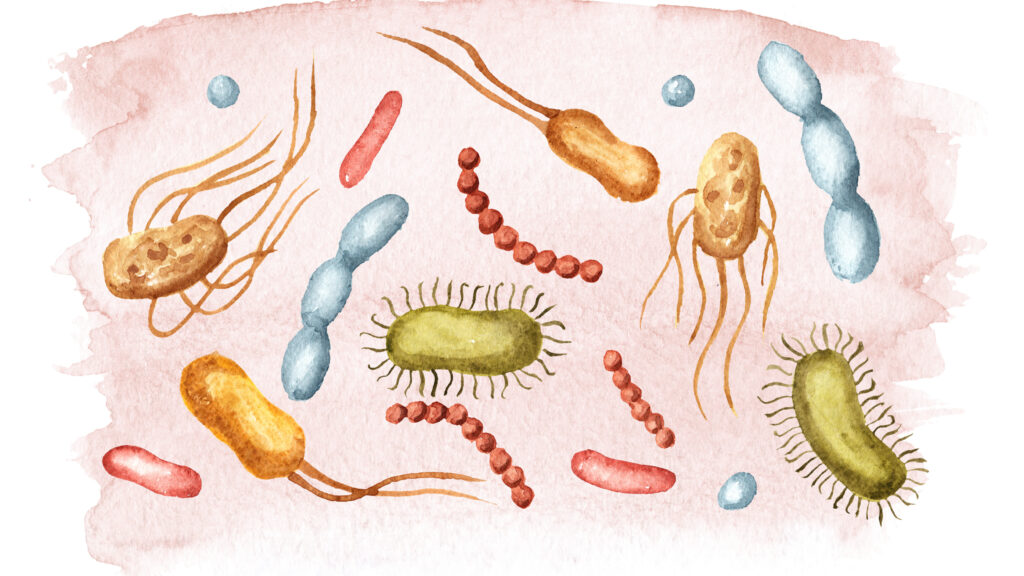Right now, inside your digestive tract, there are trillions of bacteria, fungi, and viruses that form a tiny universe known as the gut microbiome. New research shows that certain bacteria can alter antibodies so much that they’re unrecognizable to the body’s defenses — potentially leading to immune friendly fire.
The bacteria, called Akkermansia muciniphila, can strip the sugar coating from IgA antibodies, immune proteins abundant in the gut. This transformation may play a key role in the development of IgA nephropathy, an autoimmune disease of the kidneys, according to a study published Wednesday in Science Translational Medicine.
advertisement
“This is the first time it’s been shown that autoimmunity is being caused by a direct effect of the gut microbiota,” said James Gleeson, a nephrologist and researcher at the Inflammation Research Center in Paris, the study’s lead author.
Scientists don’t know what causes IgA nephropathy, and while there are a few available treatments, there is no cure. For patients who live with the condition, also known as Berger disease, IgA builds up in the kidneys, leading to inflammation, blood in the urine, and potential kidney failure. It’s considered a rare disease affecting about 60,000 people in the U.S., but it’s common among kidney conditions — 1 in 10 kidney biopsies shows signs of the condition, according to the National Institutes of Health.
“It’s a really clever hypothesis,” said Emily Balskus, a chemistry professor at Harvard University who leads a research lab focused on microbial metabolism and who was not involved in the study. Most research on the gut microbiome has only shown correlative evidence, she said, but this research begins to connect actual chemical changes in the gut to human disease.
advertisement
Researchers collected stool samples from 33 patients with IgA nephropathy as well as from 20 people with other chronic kidney diseases and 65 healthy patients. They found increased levels of bacterial species that can strip sugar from molecules in the guts of patients with the disease, particularly Akkermansia muciniphila.
Scientists found that this bacteria would strip IgA antibody of its sugar in mice altered to carry human immune genes and in human cells grown in the lab, leaving the antibody in the same form associated with IgA nephropathy. In the body, this unsweetening makes the antibody unrecognizable to the immune system.
Researchers then explored how transformed IgA makes its way into the kidney to cause problems. One possible explanation, Gleeson said, was that the modification occurred inside the gut, IgA then exits the intestines, and enters the bloodstream. The modified antibody is then deposited into the kidney, where the disease occurs.
“That seemed like the most far-out explanation, the most extravagant, unlikely scenario — but it actually turned out to be what we found [in mice],” said Gleeson.
More research is needed to nail down exactly how this chemical reaction between the bacteria and IgA plays out in humans. Akkermansia muciniphila is present in all of us and might even be beneficial when it hangs out in the inner space of the gut. Gleeson’s theory is that the bacteria somehow invades the inner layer of the kidney walls in patients who later develop IgA nephropathy.
The gut microbiome is incredibly complex, so Akkermansia muciniphila may not be the key player driving IgA modification for people across the world. That’s why the researchers are planning follow-up experiments with more diverse patient samples and hoping that other scientists in different regions will be able to replicate their results. Gleeson and his team focused on this species because it is present at high levels and can be grown in the lab. But they suspect there are other bacteria that aren’t yet known that act similarly to Akkermansia muciniphila. There could also be a more specific strain of the species that’s the culprit.
It’s still unclear exactly what causes bacteria to strip sugars from antibodies in the gut. Human genetics, the other bacteria inside the gut, and diet may all play a role, Gleeson said.
“If you look at the data, it isn’t black and white,” he said. “These are just signals coming from stool samples, which are just representative of different parts of the digestive tract.”
It’s also unclear what specific sugars are removed from the antibodies and how that chemical process occurs. “If we know that, then we can start to think about inhibiting that process,” said Balskus. “I view their work as a starting place.”
Balskus said it may one day be possible to develop small molecule drugs that target the chemical interactions Akkermansia muciniphila uses to change IgA antibody. And, despite the unknowns, the authors believe their findings could have larger implications for other autoimmune diseases. Prevotella copri is another species of bacteria found in higher levels in patients with rheumatoid arthritis — similar modifications to antibodies could be happening in that disease, Gleeson said.
“We need to stop thinking about this passive, indirect effect of the microbiota on human disease and autoimmunity,” he said, “and more start looking for the direct ways that bacteria could be modifying molecules in the human body.”

